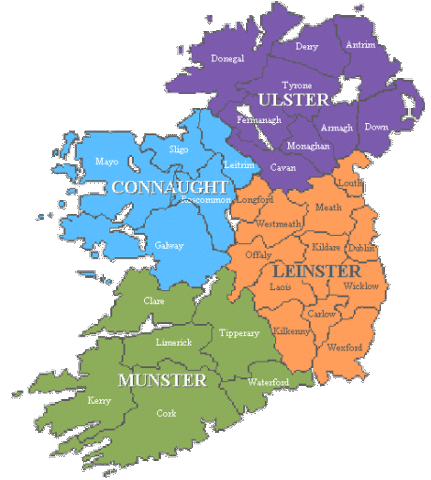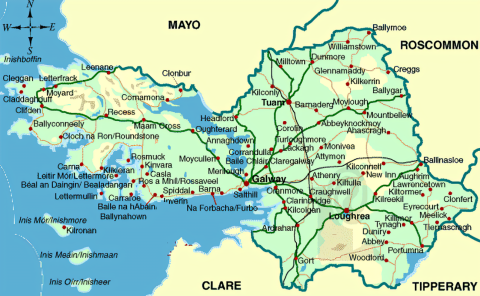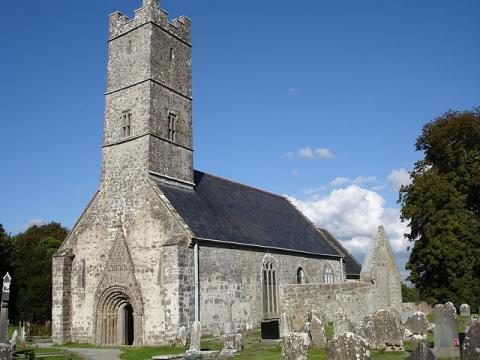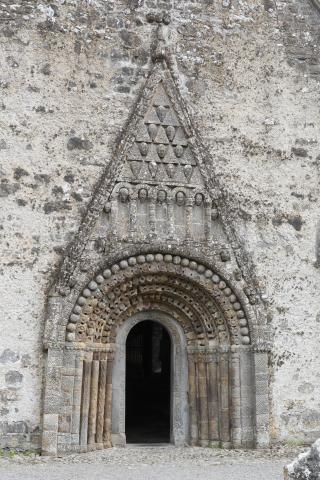[1] Sānctus Brendānus, fīlius Finlocha nepōtis Altī, dē genere Eogēnī, stāgnī Lēn regiōnis Mumenensium ortus fuit. Erat vir magnae abstinentiae et in virtūtibus clārus, trium mīlium ferē monachōrum pater.
[2] Cum esset in suō certāmine, in locō quī dīcitur Saltus Virtūtum Brendānī, contigit ut quīdam patrum ad illum quōdam vespere vēnisset, nōmine Barrindus, nepōs Neil.
[3] Cumque interrogātus esset multīs sermōnibus ā praedictō sānctō patre, coepit lacrimāre et sē prostrāre in terram et diūtius permanēre in ōrātiōne. [4] Sānctus Brendānus ērēxit illum dē terrā et ōsculātus est eum, dīcēns: “Pater, cūr trīstitiam habēmus in adventū tuō? Nōnne ad cōnsōlātiōnem nostram vēnistī? [5] Magis laetitiam tū dēbēs frātribus praeparāre. Indicā nōbīs verbum Deī, atque refice animās nostrās dē dīversīs mīrāculīs quae vīdistī in ōceanō.”
notes
Brendan’s origins, and the visit of Barrind (in Latin, Barrindus) to Brendan at his monastery in Clonfert. Barrind weeps, but Brendan says he should be happy, and he should tell them all about the wonders he (Barrind) saw in the ocean.
[1] fīlius Finlocha nepōtis Altī: “son of Finnlug of the house of Alte”; Finlocha and Altī are genitive. Alte (or Alta) was the eponymous founder of the clan Altraige.
dē genere Eogēnī ... ortus fuit: “was born from the race of Eogen.” CL would be ortus est (> LS orior II). The Eoganacht (“Descendants of Eogen”) were the ruling family in Munster, one of the Gaelic kingdoms of Ireland, in the southwest. Brendan was thus a member of one of the most powerful families in Ireland. It has been argued that the genealogy is wrong, or the text corrupt, since the descendants of Alte were not in the territory of the Eoganacht.
stāgnī Lēn regiōnis Mumenensium: “at the lake of Leane in the territory of the people of Munster.” Lēn is apparently genitive. Loch Leane (in Irish, Loch Léin) is the largest of the Killarny lakes, in County Kerry
vir magnae abstinentiae: genitive of quality. Monastic abstinence—from sex, luxurious food, and possessions—is an important theme in this text.
in virtūtibus clārus: CL would be virtūtibus clārus, ablative of specification.
trium mīlium: 3,000 is a generic large number, not a genuine estimate; it includes monks in monasteries founded by Brendan himself and in others that followed his rule.
monachōrum pater: pater in this text means “abbot.”
[2] in suō certāmine: the struggle here is spiritual, as in 1 Timothy 6:12; 2 Timothy 4.7.
dīcitur: “is called.”
Saltus Virtūtum Brendānī: “The Estate of Brendan’s Miracles.” In LL virtus can mean “miracle.” The Latin translates Irish Clúan Fearta Brenaind, now the village of Clonfert, in County Galway. One explanation of the name Clúain Fearta is that it means “Meadow of the Miracles.”
contigit ut: "it happened that" (LS contingo II.B.3.b.γ) + subjunctive in a substantive clause of result (AG 569.2).
quīdam patrum: in CL this would be pater aliquis, “a certain father” (i.e., a certain abbot). The Navigatio makes extensive use of the partitive genitive (AG § 346).
quōdam vespere: “one evening.” Forms of vesper are irregular; the ablative (locative) vespere is CL.
vēnisset: CL would be venīret.
Barrindus, nepōs Neil: “Barrind, descendant of Niall”; in Irish Barrfind (“little Finn”). Niall Noígiallach, the clan chief, died in 548 or 552 CE. Saint Barrindus (6th century) had at one point been abbot of the monastery at Drumcullen, County Offaly, though he ended up in a monastic cell in Donegal, at Kilbarron (Cell Bairfinn), near Ballyshannon.
[3] Cumque interrogātus esset: sc. Barrindus.
ā praedictō sānctō patre: i.e., by Brendan. In ML praedictus often means “the aforementioned” and functions as the equivalent of a definite article.
coepit lacrimāre et sē prostrāre ... et ... permanēre: sc. Barrindus. CL would be lacrimāvit et sē prostrāvit ... et ... permanēbat. Barrind wept not with grief but because the emotional intensity of the meeting.
[4] ōsculātus est eum: Brendan gave the Christian kiss of peace.
cūr trīstitiam habēmus: the logic seems to be, “since you are crying, you presumably expect me to cry as well, but this should be a happy occasion for both of us.”
in adventū tuō: CL would be adventū tuō, ablative of cause.
[5] laetitiam ... praeparāre: Brendan, like the desert fathers, has prophetic powers.
dē dīversīs mīrāculīs: CL would omit dē and use ablative of means. We learn in chapter 28 that it was God’s will for Brendan and his followers to learn secrets of the ocean.
vocabulary
| Finloch –a m. | the name of Brendan's father |
| nepōs nepōtis m. | grandchild; descendant |
| Alte Alti m. | the eponymous founder of the clan Altraige |
| Eogen | the eponymous ancestor of the Eoganacht, ruling dynasts of Munster |
| stagnum stagnī n. | lake |
| Lēn | Lough Leane |
| regiō regiōnis f. | region; direction, line |
| Mumensis –e | of Munster |
| abstinentia abstinentiae f. | restraint in eating and drinking |
| virtūs virtūtis f. | the power to perform miracles; miracle (ML; CL strength, courage, excellence) |
| mīlia mīlium n. | thousands |
| monachus –ī m. | a monk |
| certāmen certāminis n. | contest, struggle 2 |
| saltus saltūs m. | woodland, uncultivated land; estate |
| virtūs virtūtis f. | the power to perform miracles; miracle (ML; CL strength, courage, excellence) |
| vesper vesperis (abl. vespere) m. | evening |
| Barrindus –ī m. | Barrind |
| nepōs nepōtis m. | grandchild; descendant |
| Neil | Neil or Niall |
| interrogō (1) | to ask, question, inquire 3 |
| praedīcō praedīcere praedīxī praedictus | to say beforehand; mention |
| lacrimō lacrimāre lacrimāvī lacrimātus or lacrimor –ārī –ātus sum |
to cry, weep |
| prostrō prostrāre prostrāvī prostrātum | to fall to one’s knees; fall flat on one’s face (ML; CL prosternō prosternere) |
| permaneō permanēre permānsī permānsum | to remain |
| ōrātiō -ōnis f. | prayer |
| ērigō ērigere ērēxī ērēctus | to raise up 4 |
| ōsculōr (1) | to kiss |
| trīstitia –ae or trīstitiēs –eī f. |
sorrow |
| adventus adventūs m. | arrival, advent |
| nōnne | introduces a direct question expecting the answer "yes" |
| cōnsōlātiō –ōnis f. | a consolation, comfort |
| laetitia laetitiae f. | joy, happiness 5 |
| praeparō –parāre –parāvī –parātus |
to prepare, make preparations |
| indīcō (1) | to show, declare, make known |
| reficiō reficere refēcī refectus | to restore, revive (transitive) (ML) to take food, eat (intransitive) |
| mīrāculum –ī n. | a marvel |
| ōceanus –ī m. | the ocean |




